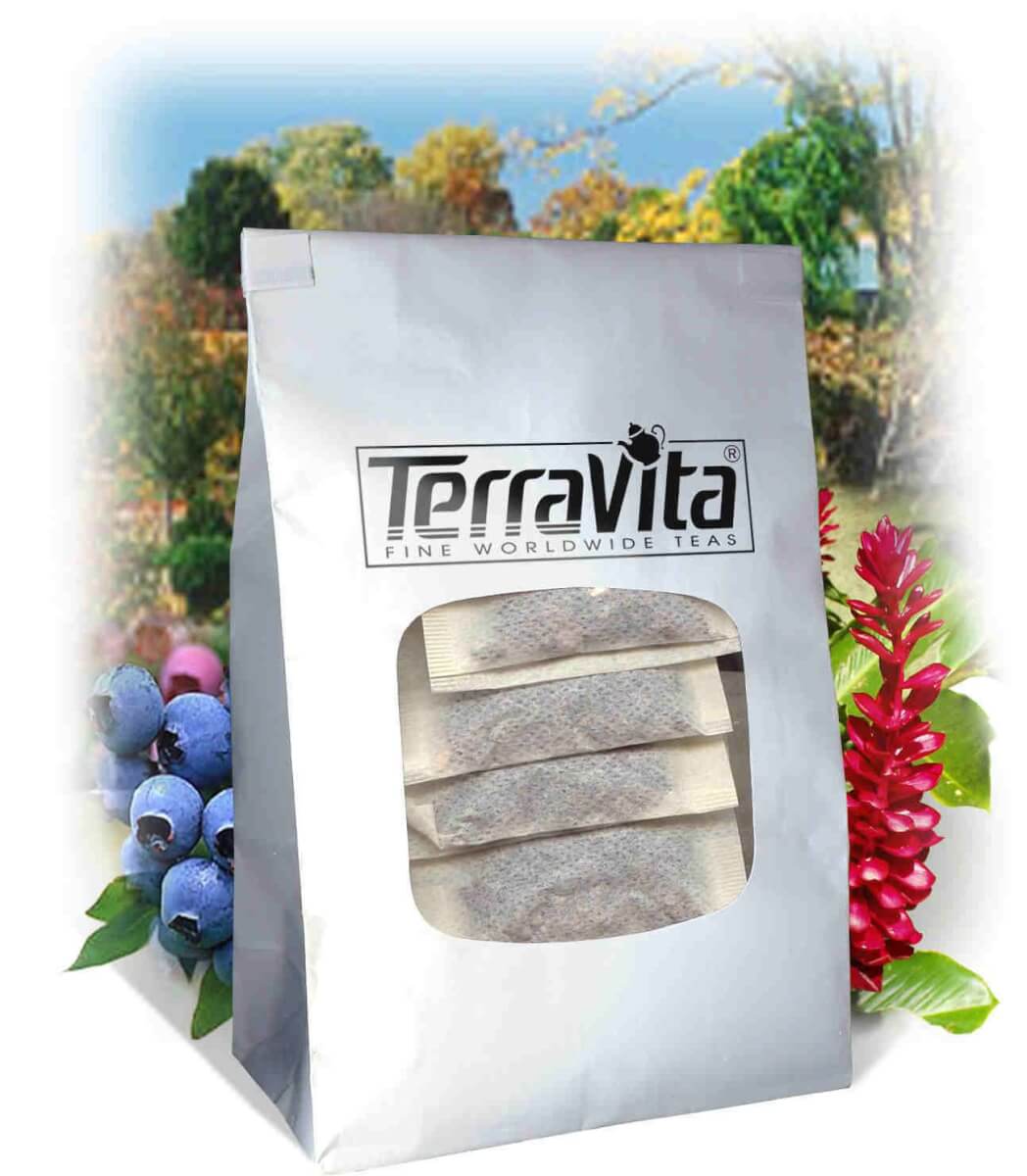Tea has been consumed for centuries for its numerous health benefits, and one area where it can truly shine is joint health. Whether you’re dealing with arthritis, inflammation, or general joint discomfort, incorporating the right teas into your daily routine can provide much-needed relief. There is certainly no end to the wonders certain herbal blends can do for you, and these teas specifically stand out for their ability to promote inflammation relief and alleviate joint pain. So today, let us explore some of the best teas for joint health and help you lead a more comfortable and active lifestyle!
Remember, while tea may offer joint-supporting benefits, it’s crucial to consult a healthcare professional for personalized advice and address any underlying conditions contributing to joint discomfort. With that in mind, the next time you reach for a warm beverage, consider brewing a cup of tea for a sip of potential joint health benefits. Thankfully, we at StudyFinds have made it easy to find the perfect blend for you as we have researched across eight expert sources to bring you today’s ranking of the top seven best teas for joint health you can find easily! Don’t agree with our list or feel we missed out on a good suggestion? No worries. We would love to hear from you in the comments down below. Now, onto the list!

The List: Best Teas for Joint Health, Per Health Experts
1. Turmeric

Turmeric tea is a warm and soothing beverage that has gained popularity for its numerous health benefits. Made from the root of the turmeric plant, this vibrant yellow spice has been used in traditional Chinese medicine for centuries. But, this spice commonly found in curries offers more than just culinary depth. Nutratea highlights its key ingredient, curcumin, a powerful antioxidant credited with its anti-inflammatory properties. Studies suggest turmeric may help alleviate joint stiffness and pain, potentially benefiting those with rheumatoid arthritis.
Grow Create Sip points to its potential benefits in reducing inflammation, managing pain, and even slowing the progression of osteoarthritis and autoimmune diseases. Additionally, they emphasize its potential role in supporting liver health, our body’s natural filtration system. Good Housekeeping sheds light on turmeric’s culinary roots, explaining its role in coloring curry dishes and giving rise to the name “golden milk” for turmeric teas.
2. Green

Green tea is a type of tea that is made from unoxidized leaves and is known for its numerous health benefits. Originating from China, green tea has been consumed for centuries and has gained popularity worldwide. It’s a treasure trove of potential health benefits! Tea Floor emphasizes its rich presence of polyphenols, antioxidants known for their anti-inflammatory properties. This makes green tea a valuable drink for those experiencing joint pain and arthritis.
T Ching reassures readers that even decaf green tea offers these benefits, making it a suitable option for those sensitive to caffeine. They also mention the variety of flavorful blends available to cater to different preferences.
Good Housekeeping attributes green tea’ anti-inflammatory nature to the high content of catechins, particularly EGCG. Studies have shown this compound’s effectiveness in reducing inflammation. They go further, mentioning potential benefits in lowering cancer and heart disease risk, while still advising moderation in consumption.
For our list of the best green teas, click here.
3. Ginger

This aromatic and spicy tea is made by steeping fresh ginger root in hot water, resulting in a soothing and invigorating drink that can be enjoyed at any time of the day. With its distinct flavor and medicinal properties, ginger tea has gained popularity worldwide and has become a staple in many cultures’ traditional remedies.
Ginger tea isn’t just a flavorful beverage; it boasts potential health benefits, particularly for those experiencing joint pain. Artful Tea highlights its well-known anti-inflammatory properties, offering relief for muscle pain, arthritis, and other inflammation-related issues.
Nutratea echoes the sentiment, praising ginger tea’s ability to ease aches and pains, thanks to its natural pain-relieving qualities. They delve deeper into the science, explaining how gingerols and shogaols, bioactive compounds in ginger, play a key role in reducing inflammation and joint pain.
Grow Create Sip mentions ginger’s use beyond joint health. With its traditional use as a natural remedy for various ailments, ginger tea is also great for the digestive system. They highlight the connection between a healthy digestive tract and a strong immune system, further emphasizing the potential benefits of incorporating ginger into your routine.
Check out our list of the best ginger teas here.
4. Nettle Leaf

Nettle leaf tea, also known as stinging nettle tea, has been consumed for centuries due to its numerous health benefits. Nettle tea also emerges as a potential ally in supporting joint health. Nutratea emphasizes its multi-faceted benefits, with anti-inflammatory properties, pain relief potential, and ability to combat oxidative stress. Packed with nutrients, it’s often used as a general health tonic, making it a valuable choice even for individuals not experiencing current joint issues.
Grow Create Sip delves into the specific nutrients nettle tea offers, mentioning its richness in calcium, magnesium, and iron, all of which contribute to helping inflammation. They go further, suggesting its potential to aid in joint and connective tissue repair and regeneration.
Finally, Everyday Health adds historical context, mentioning nettle’s use for centuries, particularly in Europe, for treating muscle and joint pain, arthritis, and gout. They cite research highlighting its antioxidant activity in inhibiting an enzyme linked to inflammation.
5. Cinnamon

Cinnamon tea is a warm and comforting beverage that has been enjoyed for centuries. With its rich aroma and distinct flavor, it is no wonder that cinnamon tea has gained popularity all around the world. This delightful drink is not only delicious, but it also offers a variety of health benefits.
Craving a comforting drink with a health boost? Look no further than cinnamon tea! Tea Floor highlights its potential to ease joint pain, combining a delightful taste with the goodness of cinnamon’s digestive, detoxifying, and immunity-boosting properties. Additionally, cinnamon tea is known for its ability to reduce inflammation and pain in the bones.
Artful Tea reinforces the anti-inflammatory properties of cinnamon tea, offering relief for both temporary and chronic inflammation, whether caused by injuries, exercise, or conditions like arthritis. They emphasize that a soothing cup of cinnamon tea can help alleviate pain. Tone Op even champions cinnamon tea as one of the most effective herbal options for managing arthritis.
6. Chamomile

Chamomile tea is a popular herbal infusion that has been enjoyed for centuries. Derived from the daisy-like flowers of the chamomile plant, this tea is well-known for its calming and soothing properties. But these benefits offer more than just a good night’s sleep. Artful Tea highlights its potential to not only ease inflammation but also support the immune system and improve overall health. They mention its versatility, allowing it to be enjoyed plain, sweetened with honey, or blended with other flavors.
Good Housekeeping also recommends chamomile for relaxation, but goes further to explain its scientific underpinnings. They mention its antioxidant and anti-inflammatory properties, contributing to reduced inflammation, eased digestion, and overall relaxation.
Tone Op expands upon the potential benefits, praising chamomile tea’s ability to reduce tension and anxiety, which can contribute to overall well-being. They delve deeper into its anti-inflammatory properties, suggesting relief for joint discomfort, swelling, and even muscle pain. They conclude by highlighting its potential to promote restful sleep, making it a valuable beverage for those seeking relief from various discomforts.
7. White Willow Bark

Tea from a tree? Yes! White willow bark tea, steeped in history, emerges as a potential natural remedy for joint pain. Nutratea highlights its claim to fame: containing salicin, the precursor to aspirin. This translates to potential pain relief for various ailments, including headaches, menstrual cramps, and, most notably, joint pain associated with osteoarthritis. Additionally, similar to other herbs mentioned, willow bark tea boasts anti-inflammatory properties, potentially reducing stiffness and promoting joint health.
Grow Create Sip explains the ideal preparation. They suggest simmering dried willow bark for a longer duration compared to other herbal teas due to its bark nature.
While acknowledging the historical use of willow bark as a pain reliever, Everyday Health emphasizes the importance of consulting healthcare professionals before incorporating it into your routine. They cite research supporting its anti-inflammatory and pain-relieving properties but caution against its interaction with certain medications and specific health conditions. They advise against its use for pregnant individuals, anyone under 16, and individuals taking specific medications like methotrexate, NSAIDs, beta-blockers, or blood thinners.
Benefits of tea for your joints:
However, with so many medications and alternate means to alleviate discomfort, what would make someone turn to tea? Of course, there is the natural remedy aspect of using an herbal blend, but we at StudyFinds wanted to dive deeper, and what we found is when it comes to joint health specifically, several reasons might make you brew a cup:
- Antioxidant Powerhouse: Many teas are rich in antioxidants like polyphenols. These combat harmful free radicals in the body, potentially reducing inflammation and oxidative stress, both linked to joint issues.
- Soothing Sips: Certain herbs and spices traditionally used in tea blends, like ginger, turmeric, and chamomile, possess anti-inflammatory properties. Enjoying these teas regularly may help soothe joint discomfort and promote overall musculoskeletal well-being.
- Hydration Hero: Staying hydrated is crucial for healthy joints and lubrication. Tea, naturally caffeine-free or with lower caffeine content than coffee, can contribute to your daily fluid intake without the jitters.
- Mindful Moments: The act of preparing and savoring a cup of tea can be a mindful practice, promoting relaxation and reducing stress. Chronic stress can exacerbate joint pain, so incorporating mindful tea rituals into your routine may offer relief.
- Flavorful Flexibility: The vast world of teas offers a plethora of flavors and blends to suit your taste. Exploring different types of tea can add variety and enjoyment to your wellness journey, making it easier to stick to a healthy routine.
You might be interested in:
- Best Joint Supplements
- Best Glucosamine Supplements
- Best Tea For Energy
- Best Tea For Digestion
- Best Tea For the Immune System
- Best Teas For A Cough
- Best Tea For Bloating
Sources:
Note: This article was not paid for nor sponsored. StudyFinds is not connected to nor partnered with any of the brands mentioned and receives no compensation for its recommendations. This article may contain affiliate links in which we receive a commission if you make a purchase.



